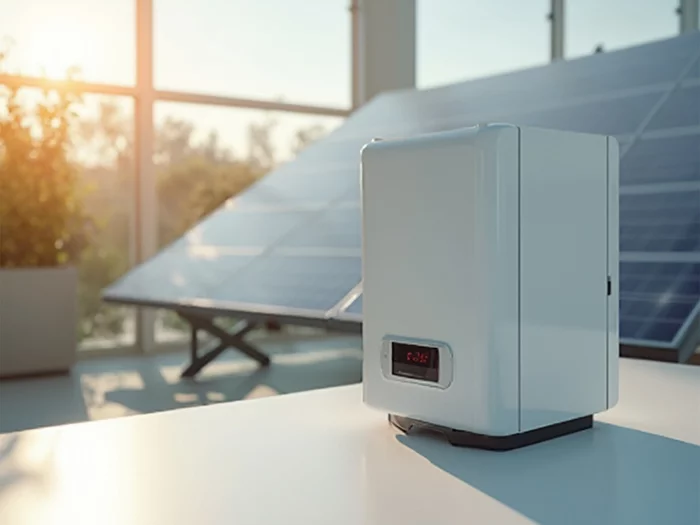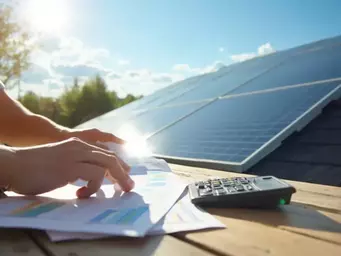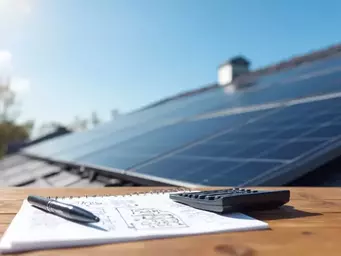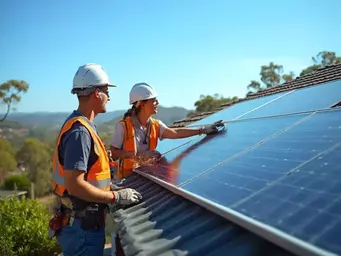String Inverters
Cost-effective for straightforward installations with minimal shading.
Unlock expert insights on solar panel installation, energy savings, and government rebates for Australian homes and businesses. Join our community of informed solar enthusiasts!
Posted on: 2025-10-10
By: Evelyn Tran
Choosing the right solar inverter can feel overwhelming, but understanding its importance is essential. Did you know that the inverter is the heart of your solar energy system? It not only converts energy but also impacts your savings!
An overview of different solar inverter technologies and their ideal applications to help you make an informed decision for your solar energy system.
Cost-effective for straightforward installations with minimal shading.
Ideal for complex rooftops with varying angles and partial shading, maximizing individual panel output.
Enhance performance in partially shaded systems, working with string inverters.
Integrate solar panels with battery storage solutions for greater energy independence.
As a solar energy consultant, I often emphasize the significance of solar inverters in any solar energy system. These devices act as the bridge between the solar panels and your home’s electricity grid. Without a proper inverter, you won't be able to convert the direct current (DC) electricity generated by your panels into alternating current (AC), which is the type of electricity used in your household. Understanding how inverters work and their role in your solar system is crucial for maximizing your energy savings and system performance. For a comprehensive overview of solar PV systems, you can refer to this Solar PV System Owner's Guide.
Solar inverters not only transform electricity but also manage system performance. They monitor the energy production of your solar panels and ensure that any excess energy is fed back into the grid or stored for later use. This is why the right solar inverter is essential—it impacts the overall efficiency of your solar energy system and ultimately your savings on energy bills. You can explore the latest trends in photovoltaic power systems by reviewing the IEA PVPS Trends Report 2023.
Solar inverters are critical components of any solar energy system, seamlessly converting the energy produced by your solar panels into a usable form. They serve a range of functions that enhance your solar system's efficiency, including:
Understanding these roles is vital when making decisions about your solar installation. An efficient inverter ensures that you harness the maximum potential of your solar panels, leading to better energy savings over time.
Choosing the appropriate solar inverter can have a significant impact on your system's efficiency ratings and your long-term savings. Each type of inverter has unique features that cater to different installation scenarios. Here are a few reasons why your choice matters:
In my experience, many homeowners underestimate the importance of this choice and may end up with an inverter that doesn’t suit their specific energy needs. By paying attention to these details, you can ensure that your solar installation will be both efficient and cost-effective. Further research on the costs and benefits of solar energy can be found in this NREL document on solar energy systems.
As you delve deeper into the world of solar inverters, it becomes evident that there are several types available, each with its pros and cons. Understanding these differences can help you make an informed decision for your solar installation. Let's explore these various types:
What factors are most important to you when selecting a solar inverter? Is it efficiency, cost, or warranty options? Share your thoughts below, and let’s create a discussion around making informed solar choices!
When it comes to selecting a solar inverter, understanding the different types available is crucial. Each inverter has its own strengths and weaknesses, making some more suitable for certain installations than others. Here’s a quick summary of the key inverter types and their typical applications:
Each of these inverter types serves a specific purpose, and understanding your unique energy needs is essential in making an informed decision.
As you consider your options, think about what features matter most to you. Here are a few recommendations based on common factors:
Taking the time to assess these factors will help you pinpoint the best inverter technology that meets your energy goals.
Now that you have a better understanding of the types of solar inverters and their applications, it’s time to start evaluating your options. Begin by:
Taking these steps will ensure you make an informed decision tailored to your situation. Remember, I’m here at Longi Solar Solutions to help guide you through this process!
Investing in the right solar inverter is not just about energy savings—it’s also about contributing to a more sustainable future! By choosing solar, you’re making a positive impact on the environment. Here are a few considerations:
Join the solar movement and embrace the energy transition! Together, we can work towards a greener future while enjoying the benefits of solar energy. Let’s make those informed decisions and take steps toward sustainability!
Here is a quick recap of the important points discussed in the article:

 Ready to unlock the potential of solar energy for your home? Understanding the financial landscape o
Ready to unlock the potential of solar energy for your home? Understanding the financial landscape o
 As you contemplate the shift to solar energy, consider this: a comprehensive understanding of the co
As you contemplate the shift to solar energy, consider this: a comprehensive understanding of the co
 Choosing the right solar installer can significantly impact your renewable energy journey. Are you r
Choosing the right solar installer can significantly impact your renewable energy journey. Are you r